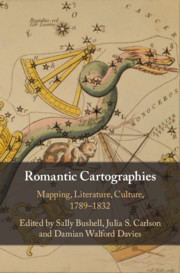Book contents
- Romantic Cartographies
- Romantic Cartographies
- Copyright page
- Contents
- Illustrations
- Notes on Contributors
- Preface
- Acknowledgements
- Introduction Romantic Cartographies
- Part I Romantic Maps, Romantic Mapping
- Part II Cartographic Encounters
- Chapter 5 Producing and Protesting Imperial Mapmindedness
- Chapter 6 Romantic Board Games and the ‘World in Play’
- Chapter 7 Carto-tactual Subjects
- Chapter 8 Wordsworth and Mandelbrot on the Coast of Britain
- Part III Beyond Romantic Cartographies
- Bibliography
- Index
Chapter 5 - Producing and Protesting Imperial Mapmindedness
Multimodal Pedagogy and Feminist Frustration in Sarah Atkins Wilson’s Geographical Primers
from Part II - Cartographic Encounters
Published online by Cambridge University Press: 15 January 2021
- Romantic Cartographies
- Romantic Cartographies
- Copyright page
- Contents
- Illustrations
- Notes on Contributors
- Preface
- Acknowledgements
- Introduction Romantic Cartographies
- Part I Romantic Maps, Romantic Mapping
- Part II Cartographic Encounters
- Chapter 5 Producing and Protesting Imperial Mapmindedness
- Chapter 6 Romantic Board Games and the ‘World in Play’
- Chapter 7 Carto-tactual Subjects
- Chapter 8 Wordsworth and Mandelbrot on the Coast of Britain
- Part III Beyond Romantic Cartographies
- Bibliography
- Index
Summary
This chapter scrutinizes a little-known cartographic commemoration, dated 1798, of what remains the last invasion of mainland Britain, in February of the previous year. It reveals this verbal-graphic, multi-genre text to be a sophisticated inscription of the contending meanings of the invasion, its aftermath, and the wider sociopolitical context at the close of the 1790s. The chapter takes the map in question – by an otherwise unknown local land surveyor, Thomas Propert – as a test case in (the limits of) historicized literary-cartographic reading. Beginning with a discussion of the ways in which map-texts – valuative objects, deeply implicated in ideology – have become fit subjects of enquiry for a theoretically nuanced geography since the ‘deconstruction of the map’ in the 1980s, the chapter conceptualizes the events and impact of the French invasion of the Strumble Head peninsula in Pembrokeshire, Wales. It then moves to a historicized ekphrastic analysis of the ways in which the map is equally committed to the values of scientific mensuration and those of distortion, caricature, and the grotesque. A text of multiple laminations and unresolved generic conflations, the map is recursive, the tense traffic between caricature and cartography deepened by the multiple ideological positions articulated by its graphic codes.
Keywords
- Type
- Chapter
- Information
- Romantic CartographiesMapping, Literature, Culture, 1789–1832, pp. 129 - 150Publisher: Cambridge University PressPrint publication year: 2020

